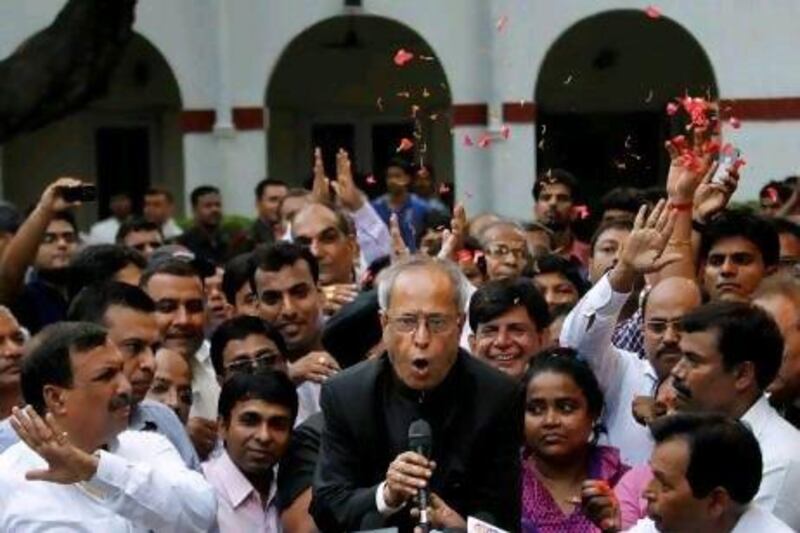NEW DELHI // Pranab Mukherjee, the candidate from India's governing Congress party and the former finance minister, was yesterday declared the country's president, receiving more than twice the votes of his nearest rival.
The counting of votes, cast on Thursday by members of parliament and the state legislatures, took nearly seven hours yesterday.
"I have received much more from the people of this great country than I have given, and now they have entrusted me with the responsibility to protect … the constitution as president of the republic," said Mr Mukherjee, emerging from his home late in the evening.
Mr Mukherjee's elated supporters danced to the beat of drums and set off firecrackers outside his home as the prime minister Manmohan Singh and Sonia Gandhi, the Congress party chief, arrived to congratulate him.
Several opposition groups also backed Mr Mukherjee.
In the final tally, Mr Mukherjee won 713,763 out of a total of 1,029,750 votes. PA Sangma of the opposition National Democratic Alliance won 315,987 votes.
Mr Mukherjee had been the front-runner ever since his candidature was announced by the ruling United Progressive Alliance (UPA), which is led by the Congress party.
"The victory was expected based on two combinations: first, the UPA has electoral college majority, and second, Pranab Mukherjee's personality plays a role," Rasheed Kidwai, author of 24 Akbar Road, a contemporary history of the Congress party published in 2010, told The National.
"He has been a minister for such a long time that Mukherjee is holding a lot of IOU vouchers from a long list of politicians."
The new president, who served as Mr Singh's finance minister from 2009 until last month, is expected to be sworn in on Wednesday.
While largely a ceremonial role, the president is the supreme commander of the armed forces, oversees the creation of a government in the event of a hung parliament and can in rare circumstances send some bills back to lawmakers for reconsideration.
The next general election is due by early 2014.
Married with two sons and a daughter, Mr Mukherjee was a teacher and journalist before entering parliament in 1969.
He is a veteran politician having had stints in charge of India's foreign, defence, commerce and steel ministries. As finance minister, he headed as many as two dozen ministerial panels on issues ranging from food production to fuel prices. He was often called upon to appease government allies angered by proposed policy changes, not always emerging victorious.
Mr Sangma, fielded by the NDA, which is headed by the Bharatiya Janata Party (BJP), drew votes mainly in BJP-ruled states such as Goa, Gujarat, Chhattisgarh and Madhya Pradesh.
A former speaker of parliament, Mr Sangma told the media yesterday that he may still contest the election result, on the grounds that Mr Mukherjee's nomination was technically invalid.
This month, Mr Sangma petitioned the election commission that Mr Mukherjee could not stand for president because he still occupied an office of profit - chairmanship of an education institution in Kolkata - when his nomination papers were filed.
When the election commission rejected his petition, saying that Mr Mukherjee had officially resigned the position two weeks before his nomination, Mr Sangma claimed that the signature on his resignation letter was fabricated.
Yesterday, Mr Sangma also called the process of the presidential poll "exceptionally partisan and political", alleging that the UPA promised economic packages for states - or threatened to withhold them - to get state legislators to fall behind Mr Mukherjee. Mr Kidwai called Mr Sangma's threat to challenge the election "pretty weak" and "a loser's argument".
"Sangma should have challenged it leading up to the presidential elections," he said.
"He should accept his loss. This looks bad for him." Swapan Dasgupta, a political columnist who writes for the Times of India and Telegraph newspapers, told The National that the result of the election would "probably go to court".
"This is a hugely technical issue centred on whether [Mr Mukherjee] sent his resignation at the right time or it was an afterthought and has been backdated," Mr Dasgupta said. "This is a forensic issue."
Mr Dasgupta called Mr Mukherjee "an experienced hand" in politics.
"He will add heft to that post with political clout and acumen," he said.
"He is quite competent to complement India's foreign relations."
[ sbhattacharya@thenational.ae ]
Follow
The National
on
[ @TheNationalUAE ]
& Surya Bhattacharya on
[ @SuryatapaB ]
ssubramanian@thenational.ae
Follow
The National
on
[ @TheNationalUAE ]
& Samanth Subramanian on
[ @Samanth_S ]
* With additional reporting from Bloomberg





